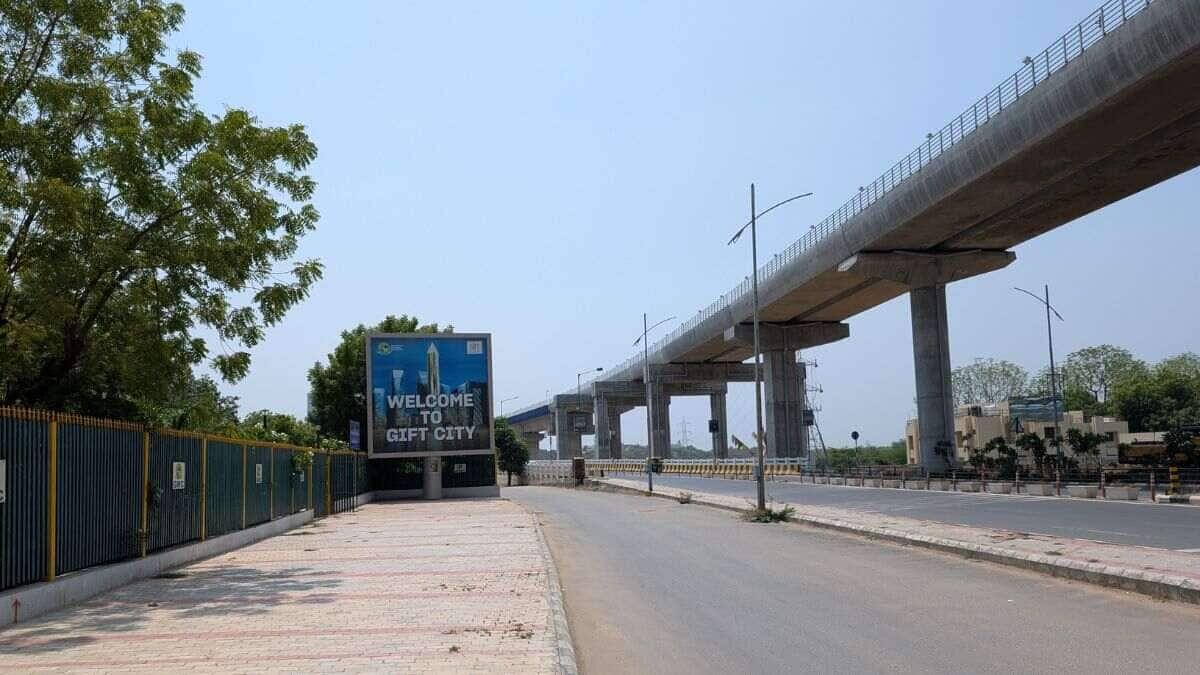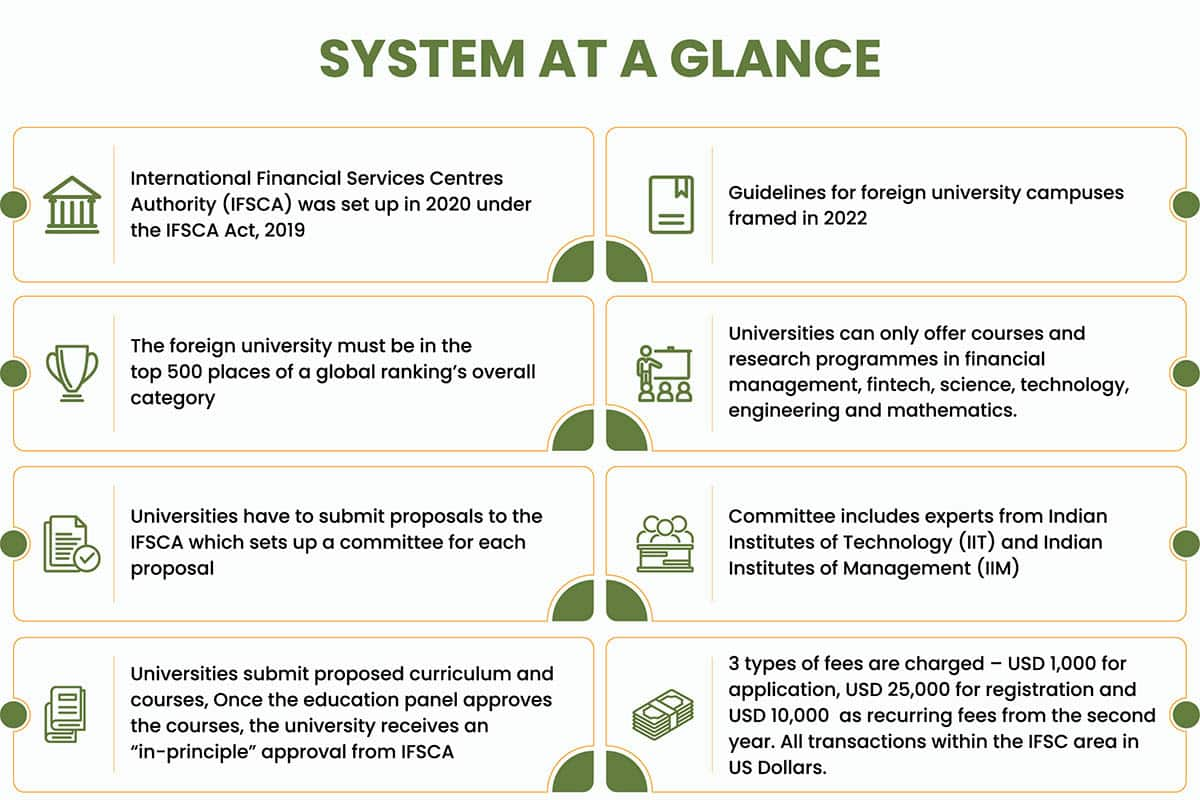60 students and a year in GIFT City: Foreign universities plan expansion but rely on ‘mothership’ funding
Sheena Sachdeva | July 10, 2025 | 12:41 PM IST | 8 mins read
As GIFT City prepares for more universities, the first two foreign campuses in India – Deakin and UoW – have admitted a handful of students but plan to expand offerings

GANDHINAGAR: In the first year of their operations in India, University of Wollongong (UoW) and Deakin University together managed to admit less than 60 students between them – Deakin, 43 and UoW, nine. According to Deakin’s David Das, head of campus operations, even this was a success. They were expecting 15-20, he said.
UoW and Deakin University, both top-ranked Australian public universities, are the first two foreign institutions to set up campuses and offer degrees in India. They were announced with massive fanfare in 2022, launched their first programmes in 2024 and in October, 2025, Deakin at least will see its first batch graduate and, their administrators hope, find jobs in the financial corporations whose offices surround them in GIFT City.
Experience of the first foreign campuses in India is defined and controlled almost entirely by GIFT City. The sprawling 886-acre Gujarat International Finance Tec-City (GIFT) on the banks of the Sabarmati, in Gandhinagar, was set up to facilitate trade in foreign currency within India. Here, the International Financial Services Centres Authority (IFSCA), a central regulatory body for the sector headquartered in GIFT City, is all-powerful.
The university centres are within the 256 acres of GIFT City that are allotted to the GIFT Special Economic Zone. It is currently marked out by a collection of massive glass-encrusted buildings and other under-construction structures, jutting up from flat, featureless land, stripped bare of all vegetation.
The offshore campuses are not so much campuses as single-floor set-ups in high-rise office buildings. University of Wollongong, for example, occupies the sixth floor of Pragya II Building and has asset management and law firms, international banks, technology companies and consultancies in the floors above and below. Deakin shares the building with a co-working space on the ground floor. The atmosphere, in consequence, is less academic and more big-corporation.
 Deakin University, GIFT City campus (Image: Careers360)
Deakin University, GIFT City campus (Image: Careers360)
Given that the two universities offer only 18-month postgraduate programmes related to the finance sector, this too is regarded as an advantage. Deakin offers Masters in cyber security and Masters in business analytics; UoW a Masters in financial technology and Masters in financial technology (Extension) with two different timeframes – one with 18 months and another with two years–with only difference of a “workplace internship” in the latter.
In May, Careers360 visited GIFT City and the first international universities in India to see how they were settling in. This is the first of a three-part series. Parts two and three look at the GIFT City student experience and the education regulatory structure, respectively.
GIFT City Gujarat universities
In January, two more foreign universities received “in-principle” approval from the IFSCA for campuses in GIFT City. These are Queen’s University Belfast, Ireland and Coventry University, England. Further, University of Surrey, UK, and University of San Diego “have shown interest”, said a GIFT City official.
“The two UK universities which have received in-principle approval will be starting their centres at GIFT City from January 2026,” he said. Coventry, at least, will likely offer undergraduate programmes –BSc Honours in International Business Management and BSc Honours in Business and Finance – in addition to PG courses in construction and project management, business analytics, financial analytics and finance.
The GIFT City location has narrowed the range of academic options to just what’s relevant to the financial sector. According to the regulations, framed in 2022, all programmes have to be related to fintech. Plus, all courses must be vetted and approved by the IFSCA, even though it wasn’t originally structured to be an educational administrator and its policy framework wasn’t intended to regulate higher education.
“It was a joint effort and everyone contributed equally in a proactive way. It was like working together as partners,” said Das. “It wasn't an easy task because all the regulations were made for companies and organisations, not for educational institutions. So, we had to basically make on-the-go changes to make it relevant from an education perspective. We had to make those tweaks, like turnover as a for-profit company and a few others. But we worked together on this.”
 GIFT City Gujarat's education system for foreign universities (Image: Careers360)
GIFT City Gujarat's education system for foreign universities (Image: Careers360)
GIFT City Policy: Fees and freedom
The GIFT City policy-makers did away with a major roadblock in the way of foreign universities seeking to set up in India – IFSCA allowed the repatriation of profits made back to Australia. The University Grants Commission’s policy, which followed IFSCA’s, has also adopted this. As long as the universities pay an annual fee, regulation is lenient.
“They gave us the freedom to decide how much we want to charge for the courses, how much scholarship we want to extend, everything is our choice. And every time there's a change in operations, we have to inform authorities,” said Nimay Kalyani, director, India campus, UoW.
University of Wollongong’s programme fee, charged in Australian Dollars, roughly works out to Rs 16 lakh. Deakin University, which originally charged Rs 22 lakh for the 18-month programme, gave all enrolled students a 20-25% waiver in May, calling it a “market correction” and more-or-less matching UoW fees.
GIFT City Jobs: No placement promise
Aiming to mainly train professionals for GIFT City jobs, UoW and Deakin held meetings with corporations in the city to understand their requirements. “We did roundtables, especially for the GIFT City, to ascertain which courses and areas we should focus on and for that, we had to take feedback from the ecosystem,” said Kalyani.
While Deakin launched in July 2024, UoW’s session was pushed to November 2024. “We came here with the confidence that we will get a good response and we have received it. However, due to unforeseen circumstances, our schedule got delayed and we missed the academic calendar in July. We missed July and we went on to November. So, now we are in an off-season and still have a fairly decent batch size as a first cohort,” said Kalyani explaining the very low strength of UoW’s inaugural batch. It also includes just one woman candidate who became the default choice for the ‘Women Leaders in FinTech’ scholarship.
In drawing 43 students to its first batch, Deakin apparently outdid its own expectations. “Although we had certain numbers in mind, we were very flexible. It was more about understanding the market, getting the first cohort in and working with them. For any transnational education programme, in the first instance, the expected number is around 15 to 20 students as a standard, and we got 43 students,” said Das.
Both universities were also surprised by the importance accorded to placements. “We faced a degree of scepticism because Australian universities do not guarantee jobs,” said Kalyani. They have education and placement fairs but there’s no concerted “drive”.
“In the Indian education system, students expect a return on investment. It's an unfortunate fact but it is how the understanding has evolved, especially from an institute offering postgraduate degrees. This was another area where we were under-prepared,” he added.
However, the institute now has more companies as partners than the number of students seeking jobs. It has partnered with IBM, Afthonia Lab, Bangalore-based incubator, Manav Rachna University, Faridabad; Amity University, Noida and others.
 GIFT City Gujarat is still under construction (Image: Careers360)
GIFT City Gujarat is still under construction (Image: Careers360)
IFSCA Guidelines: Post-study rights
In the initial guidelines issued by IFSCA, students were promised post-work visa or similar “privileges” after the completion of their course. But no such privilege is forthcoming.
Post-study work rights allowed to students who graduate from the parent campuses will not be extended to those leaving GIFT City.
“It is up to the immigration department and beyond our control,” said Kalyani, adding “So whether students post their graduation apply for a job in India or Australia or any other part of the world, the equivalency of the degree exists because of its global reputation which leads to privileges that otherwise Indian institutes might not have.”
GIFT City university teachers
Most teachers at the universities come from having studied or worked abroad. Deakin hired five Indians – two from the UK, two from Indian Institutes of Management and one ‘fresher’.
“The reason we chose them was because of their research which was very important for us …. Also [for] the areas that we were teaching, business analytics and cyber security, we did not find a very big mass of applications as they are very niche,” stated Das.
UoW recruited two teachers and a dean from India and also drew academics from other international campuses, including Dubai.
Both have faculty members from other campuses visiting temporarily to teach master classes and workshops and guest lectures are organised in collaboration with other institutions, including IIMs.
Profit Plan: GIFT City sponsors, donors
In the next few years, GIFT City will get a designated university building within the GIFT SEZ area. Its design will be decided through a competition with the winner getting Rs 40 lakh. “It will get ready in the next four to five years,” said the GIFT City official. “The building will include basic common amenities.”
At present, GIFT City is making nothing from its education ventures. “The main goal is for the universities and students to come in,” said the official. “As and when the city is completely operational, that is when maybe the profits would start coming in. However, we have enough space for new foreign universities to set up their campuses for now.”
Deakin and UoW, too, focus on the long-term and it’ll be a while before either breaks even.
“We are not making money as we have invested significantly in the infrastructure and we are not expecting to make money in the next three or four years. The impact that we want to give through this campus is state-of-the-art infrastructure for our students, including IT infrastructure, which is much more advanced than any Indian institution,” said Das.
UoW is similarly “dependent on the mothership”. “Our campus is probably the best and most expensive campus in the country with technology platforms and state-of-the-art facilities. So, yes, we're still in the process of recovering our investment,” said Kalyani.
To do that and ultimately turn a profit, they seem to be going down the same route as many established universities in India – counting on candidates sponsored by companies and donations from “philanthropic billionaires”. This is “already happening” in UoW’s Australia and Dubai campuses. “They will happen in India as well but we have to grow and we have to be larger,” said Kalyani.
UoW plans to launch undergraduate and PG courses in areas like artificial intelligence, cyber security, finance and accounting.
Follow us for the latest education news on colleges and universities, admission, courses, exams, research, education policies, study abroad and more..
To get in touch, write to us at news@careers360.com.